Sinking of the Lusitania and War Propaganda
In February, 1915, the German government announced an unrestricted warfare campaign. This meant that any ship taking goods to Allied countries was in danger of being attacked. This broke international agreements that stated commanders who suspected that a non-military vessel was carrying war materials, had to stop and search it, rather than do anything that would endanger the lives of the occupants.
The Lusitania, was at 32,000 tons, the largest passenger vessel on transatlantic service, left New York harbour for Liverpool on 1st May, 1915. It was 750ft long, weighed 32,500 tons and was capable of 26 knots. On this journey the ship carried 1,257 passengers and 650 crew.
At 1.20pm on 7th May 1915, the U-20, only ten miles from the coast of Ireland, surfaced to recharge her batteries. Soon afterwards Captain Schwieger, the commander of the German U-Boat, observed the Lusitania in the distance. Schwieger gave the order to advance on the liner. The U20 had been at sea for seven days and had already sunk two liners and only had two torpedoes left. He fired the first one from a distance of 700 metres. Watching through his periscope it soon became clear that the Lusitania was going down and so he decided against using his second torpedo. The crew attempted to put women and children into the lifeboats. Unfortunately, only six of the 48 lifeboats were launched successfully. After a second, larger explosion, the Lusitania rolled over and sank in eighteen minutes.
Primary Sources
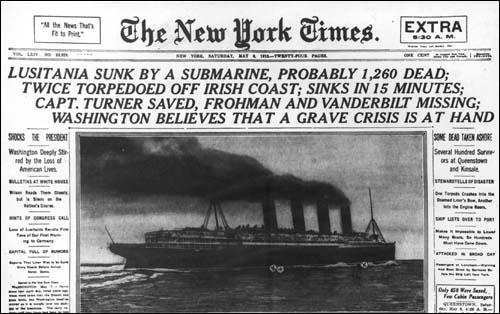
(Source 2) Admiral Hugo Von Pohl, Chief of Marine Staff (4th February, 1915)
The waters round Great Britain and Ireland, including the English Channel, are hereby proclaimed a war region.
On and after February 18th every enemy merchant vessel found in this region will be destroyed, without its always being possible to warn the crews or passengers of the dangers threatening.
Neutral ships will also incur danger in the war region, where, in view of the misuse of neutral flags ordered by the British Government, and incidents inevitable in sea warfare, attacks intended for hostile ships may affect neutral ships also.
(Source 3) Statement issued by the German Embassy on 22nd April 1915.
Travellers intending to embark for an Atlantic voyage are reminded that a state of war exists between Germany and her allies and Great Britain and her allies; that the zone of war includes the waters adjacent to the British Isles; that in accordance with the formal notice given by the Imperial German Government, vessels flying the flag of Great Britain or any of her allies are liable to destruction in those waters; and that travellers sailing in the war zone in ships of Great Britain or her allies do so at their own risk.
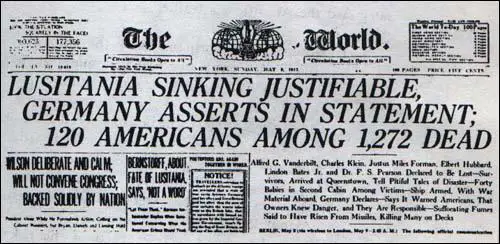
(Source 5) Margaret Haig Thomas, This Was My World (1933)
In New York, during the weeks preceding the last voyage of the Lusitania, there was much gossip of submarines. It was freely stated and generally believed that a special effort was to be made to sink the great Cunarder so as to inspire the world with terror. She was at that time the largest passenger boat afloat. The few pre-war passenger boats of greater tonnage had been commandeered for war service of various kinds.
On Saturday, May 1st (the day on which the Lusitania was to sail), in order that there might be no mistake as to German intentions, the German Embassy at Washington issued a warning to passengers couched in general terms, which was printed in the New York morning papers directly under the notice of the sailing of the Lusitania. The first-class passengers, who were not due on board till about ten o'clock, had still time after reading the warning, unmistakable in form and position, to cancel their passage if they chose. For the third-class passengers it came too late. As a matter of fact, I believe that no British and scarcely any American passengers acted on the warning, but we were most of us very fully conscious of the risk we were running. A number of people wrote farewell letters to their home folk and posted them in New York to follow on another vessel.
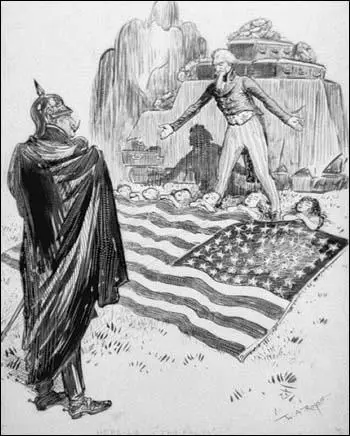
(Source 7) The Manchester Guardian (10th May, 1915)
The death roll in the Lusitania disaster is still not certainly known. About 750 persons were rescued, but of these some 50 have died since they were landed. Over 2,150 men, women and children were on the liner when she left New York, and since the living do not number more than 710, the dead cannot be fewer than 1,450.
What the American people think of the crime is plain. Their newspapers are violent in denunciation; the public, except for the German-Americans, who have celebrated the event as a great and typical victory for their native country, are enraged. How President Wilson regards the affair no one knows. A semi-official statement issued from the White House says he knows the nation expects him to act with deliberation as well as firmness.
It should be remembered that the United States have many and peculiar difficulties of their own, and that Dr. Wilson personally will go to almost any length before he consents to a breach with Germany. His fixed aim is to preserve the world's respect by abstaining from any course of action likely to awaken the hostility of either side in the war, and so to keep the United States free to undertake the part of peacemaker.
Throughout the world the news has been heard with horror. In Norway, Sweden, Holland, Spain and Italy, as well as in the territories of the Allied Powers, the newspapers express an unhesitating condemnation. Even journals who regard Germany as a friend have no excuse to offer. In several quarters the British Navy is sharply criticised. Why, it is asked, were not the submarines known to be off the Irish coast hunted down? Why was the liner not escorted into safety? These questions, which are to be found here and there in the neutral press, have been put also by many among the survivors. Possibly an official answer will be made in due course.
In Germany and Austria the people are undisguisedly delighted. They see in the sinking of the liner a fulfilment of all their boasts about the submarine blockade, which has hitherto signally failed to win any military or naval advantage. The newspapers seek to find an excuse in the Lusitania's armament. Their charge is false. Both the Admiralty and the Cunard company declare positively that the ship carried no guns. She had never done so, and the Government, although they had the right to employ her, had never called for her services. She was a genuine non-combatant merchant vessel.
Survivors tell the most terrible stories of their adventures. Some say the crew behaved bravely, others make no mention of such a thing, but all agree that few of the lifeboats were launched, that the ship went down quickly, and that hundreds were sucked under with her. Several survivors were drawn by the rush of water into the funnels, to be thrown to the surface a few moments later. Two torpedoes struck the liner, and she sank with half an hour of the first blow. Because of an injury to the engines it was not possible to stop the propellers at once, and the ship did not lose way until ten minutes had passed. During those precious ten minutes no boats could be launched from the moving vessel.
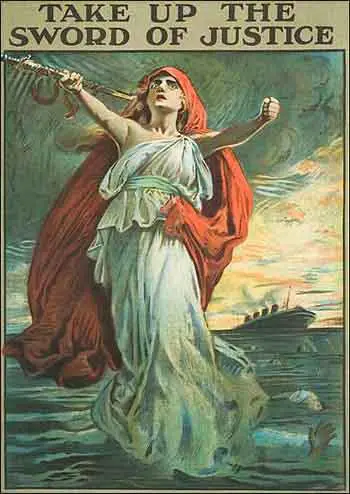
(Source 9) McMillan Adams was an American passenger aboard the Lusitania when it was torpedoed on 7th May 1915.
I was in the lounge on A Deck when suddenly the ship shook from stem to stem, and immediately started to list to starboard. I rushed out into the companionway. While standing there, a second, and much greater explosion occurred. At first I thought the mast had fallen down. This was followed by the falling on the deck of the water spout that had been made by the impact of the torpedo with the ship. My father came up and took me by the arm. We went to the port side and started to help in the launching of the lifeboats. Owing to the list of the ship, the lifeboats had a tendency to swing inwards across the deck and before they could be launched, it was necessary to push them over the side of the ship. While working there, the staff Captain told us that the boat was not going to sink, and ordered the lifeboats not to be lowered. He also asked the gentlemen to help in clearing the passengers from the boat deck (A Deck). it was impossible to lower the lifeboats safely at the speed at which the Lusitania was still going. I saw only two boats launched from this side. The first boat to be launched, for the most part full of women, fell sixty or seventy feet into the water, all the occupants being drowned. This was owing to the fact that the crew could not work the davits and falls properly, so let them slip out of their hands, and sent the lifeboats to destruction. I said to my father "We shall have to swim for it. We had better go below and get our lifebelts."
When we got down to Deck D, our cabin deck, we found it was impossible to leave the stairs, as the water was pouring in at all the port holes. Finally, we reached the boat deck again, this time on the starboard side, and after filling a lifeboat with women and children, we jumped into it. The lifeboat was successfully lowered until we were about twelve feet from the water, when the man at the bow davit lost his nerve, and let the rope go. Most of the occupants were thrown into the water, but we, being in the stern, managed to stay in. The lifeboat was full of water, but the sailors said it would float if only we could get it away from the Lusitania which was now not far from sinking. My father threw off his overcoat, and worked like a slave trying to help loose the falls from the boat. This, however, was impossible. B. Deck was then level with the water, and I suggested to my father we should climb up and get into another lifeboat. He, however, looked up, saw the Lusitania was very near its end, and was likely to come over on us, and pin us beneath. He shouted to me to jump, which I did. We were both swimming together in the water, a few yards from the ship, when something separated us. That was the last I saw of him.
After about an hour I was helped on to a collapsible boat which was upside down. It was at this time that we saw smoke coming towards us on the horizon out to sea, but as soon as the funnel was just in sight, it went away again from us. This must have been one of the boats that the German submarine stopped from coming to our rescue.
(Source 10) Margaret Haig Thomas, This Was My World (1933)
It became impossible to lower any more from our side owing to the list on the ship. No one else except that white-faced stream seemed to lose control. A number of people were moving about the deck, gently and vaguely. They reminded one of a swarm of bees who do not know where the queen has gone.
I unhooked my skirt so that it should come straight off and not impede me in the water. The list on the ship soon got worse again, and, indeed, became very bad. Presently the doctor said he thought we had better jump into the sea. I followed him, feeling frightened at the idea of jumping so far (it was, I believe, some sixty feet normally from "A" deck to the sea), and telling myself how ridiculous I was to have physical fear of the jump when we stood in such grave danger as we did. I think others must have had the same fear, for a little crowd stood hesitating on the brink and kept me back. "And then, suddenly, I saw that the water had come over on to the deck. We were not, as I had thought, sixty feet above the sea; we were already under the sea. I saw the water green just about up to my knees. I do not remember its coming up further; that must all have happened in a second. The ship sank and I was sucked right down with her.
The next thing I can remember was being deep down under the water. It was very dark, nearly black. I fought to come up. I was terrified of being caught on some part of the ship and kept down. That was the worst moment of terror, the only moment of acute terror, that I knew. My wrist did catch on a rope. I was scarcely aware of it at the time, but I have the mark on me to this day. At first I swallowed a lot of water; then I remembered that I had read that one should not swallow water, so I shut my mouth. Something bothered me in my right hand and prevented me striking out with it; I discovered that it was the lifebelt I had been holding for my father. As I reached the surface I grasped a little bit of board, quite thin, a few inches wide and perhaps two or three feet long. I thought this was keeping me afloat. I was wrong. My most excellent lifebelt was doing that. But everything that happened after I had been submerged was a little misty and vague; I was slightly stupefied from then on.
When I came to the surface I found that I formed part of a large, round, floating island composed of people and debris of all sorts, lying so close together that at first there was not very much water noticeable in between. People, boats, hencoops, chairs, rafts, boards and goodness knows what besides, all floating cheek by jowl. A man with a white face and yellow moustache came and held on to the other end of my board. I did not quite like it, for I felt it was not large enough for two, but I did not feel justified in objecting. Every now and again he would try and move round towards my end of the board. This frightened me; I scarcely knew why at the time (I was probably quite right to be frightened; it is likely enough that he wanted to hold on to me). I summoned up my strength - to speak was an effort - and told him to go back to his own end, so that we might keep the board properly balanced. He said nothing and just meekly went back. After a while I noticed that he had disappeared.
(Source 11) Gottlieb von Jagow, statement issued after the sinking of the Lusitania (18th May, 1915)
The Imperial Government must specially point out that on her last trip the Lusitania, as on earlier occasions, had Canadian troops and munitions on board, including no less than 5,400 cases of ammunition destined for the destruction of brave German soldiers who are fulfilling with self-sacrifice and devotion their duty in the service of the Fatherland. The German Government believes that it acts in just self-defense when it seeks to protect the lives of its soldiers by destroying ammunition destined for the enemy with the means of war at its command.
(Source 12) Theobald von Bethmann-Hollweg speech in the Reichstag on the sinking of the Lusitania (19th August, 1915)
For our and other peoples' protection we must gain the freedom of the seas, not as England did, to rule over them, but that they should serve equally all peoples. We will be and will remain the shield of peace and freedom of big and small nations.

(Source 14) Die Kölnische Volkszeitung (May 1915)
The sinking of the giant English steamship in a success of moral significance which is still greater than material success. With joyful pride we contemplate this latest deed of our Navy. It will not be the last. The English wish to abandon the German people to death by starvation. We are more humane. we simply sank an English ship with passengers, who, at their own risk and responsibility, entered the zone of operations.
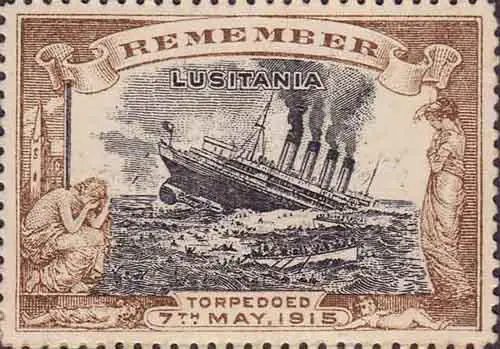
(Source 16) The Great World War: Volume III (1917)
The Lusitania was 790 feet long, 88 feet broad, and her gross tonnage was 32,500. There was, of course, one way in which she might be made available for Admiralty service. Though she was built as a swift passenger-ship, and a very large proportion of her space was occupied by engines and cabins, and her actual capacity was small in comparison to her tonnage, still she could carry a good deal, and her speed, 26.6 knots at her best, would enable her to escape the pursuit of most cruisers. These qualities would make her valuable as a carrier of ammunition.
When the war broke out the Admiralty did not call on the company to hand the Lusitania over to them for service. She continued to be employed as a passenger-ship. The German Government has maintained, and continued to maintain, that the British Admiralty was guilty of what would have been a singularly mean device. It alleged, and went on alleging, that though the Lusitania continued to run as a passenger-ship she was loaded with contraband in the form of explosives, that the travellers who crossed the Atlantic in her were simply a blind, and that they were, in fact, allowed to embark in ignorance of the danger they were running, and in the hope that their presence would save the ship from attack.
The Germans quoted the undoubted fact that the Lusitania was warned at an earlier stage of the war to hoist the American flag when approaching the coast of Ireland as a proof that she was really in the service of the Admiralty. This assertion was firmly denied both at home and in America, and it was impossible to believe that the German Government possessed evidence of the truth of its charge. If it had, it possessed an easy means of both stopping the Lusitania and discrediting the British Admiralty. The laws of the United States forbid the carrying of large quantities of explosives in passenger ships. Had the German Government held even prima facie evidence that explosives were being smuggled on board contrary to the United States law it would have taken the correct legal steps to call the offenders to account. It had every reason for taking this course, since a demonstration that the British Admiralty was making a gross and most insulting abuse of the hospitality of the port of New York must have produced an impression highly favour- able to Germany on public opinion in America. There can be but one explanation of the failure of the German Embassy at Washington to avail itself of so effective a weapon; and it is, of course, that there was no proof of the alleged violation of neutrality and American Law.
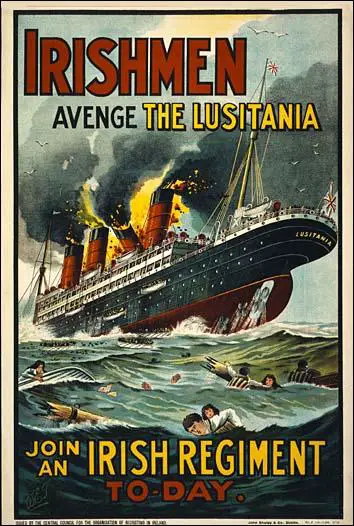
(Source 18) Ernest Sackville Turner, Dear Old Blighty (1980)
The King, as everyone knew, was the Kaiser's cousin; probably he had more relatives on the wrong side than any of his subjects... However, the occupants of thrones are not faced with the embarrassment of actually sticking bayonets into each other, nor are international industrialists. From humbler homes, Englishmen who had married German women went off to the Front to kill Germans and so did their sons, leaving mum to like it or lump it. Was she not now a British subject? In some ways "Hunwives" were luckier than those English women who had married Germans of low degree and had no opportunity of going into exile, even if they had wished to do so. Overnight the war turned them into second-class citizens. Their husbands, if of military age, were interned and because they themselves were aliens in the eyes of the law they were subject to travel restrictions; they also received lower allowances than German-born wives. In Acton Police Court the father of a weeping English-born woman told the bench that her husband, a German, had been ordered to leave his house after the Lusitania sinking. Her father protested, "My daughter is English." But the clerk retorted, "She is German, not English." The court ruled that the landlord was entitled to turn the couple out if he wished. There was little sympathy for such victims, the general feeling being that "it serves them right for marrying Huns"; but the Quakers who befriended persecuted aliens did what they could for these native outcasts.
(Source 19) Greg Bemis Jr, purchased the Lusitania in 1968. He was interviewed about the disaster in an article published in the Sunday Times (5th May 2002)
The fact is that the ship sank in 18 minutes. That could only happen as the result of a massive second explosion. We know there was such an explosion, and the only thing capable of doing that is ammunitions. It's virtually impossible to get coal dust and damp air in the right mixture to explode, and none of the crew who were working in the boiler rooms and survived say anything about a boiler exploding. I don't think there's any question that there was a steamline explosion, but that wouldn't have damaged the ship to the point where it sunk in 18 minutes. It's blarney, part of another cover story.

for your Americans. I may drown some more" Life Magazine (13th April, 1916)
(Source 21) Basil Liddell Hart, History of the First World War (1980)
Germany... torpedoed the great Lusitania, May 7th, 1915. The drowning of 1,100 people, including some Americans, was a spectacular brutality which shocked the conscience of the world, and appealed more forcibly to American opinion than even the desolation of Belgium. This act, succeeded by others, paved the way for the entry of the United States into the war, though it was to be later than seemed likely on the morrow of the tragedy.
(Source 22) Martin Gilbert, First World War (1994)
At noon on May 7, U-20 sighted the cruiser Juno, but as she was zigzagging and going at full speed, Captain Walther Schwieger gave up the chase. An hour and a half later he sighted the Lusitania. A single torpedo was fired, without warning. The Lusitania sank in eighteen minutes. Of the 2,000 passengers on board, 1,198 were drowned, among them 128 Americans... The sinking of the Luisitania shocked American opinion, but President Wilson had no intention of abandoning neutrality.
(Source 23) Howard Zinn, A People's History of the United States (1980)
It was unrealistic to expect that the Germans should treat the United States as neutral in the war when the U.S. had been shipping great amounts of war materials to Germany's enemies... The United States claimed the Lusitania carried an innocent cargo, and therefore the torpedoing was a monstrous German atrocity. Actually, the Lusitania was heavily armed: it carried 1,248 cases of 3-inch shells, 4,927 boxes of cartridges (1,000 rounds in each box), and 2,000 more cases of small-arms ammunition. Her manifests were falsified to hide this fact, and the British and American governments lied about the cargo.

(25) Alan Travis, The Guardian (1st May 2014)
A 1980s salvage operation on the wreck of the Lusitania, the Cunard luxury liner that was torpedoed in the first world war, triggered a startling Foreign Office warning that its sinking could still "literally blow up on us".
Newly released secret Whitehall files disclose that a Ministry of Defence warning that "something startling" was going to be found during the August 1982 salvage operation raised such serious concerns that previously undeclared war munitions and explosives might be found that divers involved were officially warned in the strongest terms of the possible "danger to life and limb" they faced.
Foreign Office officials also voiced serious concerns that a final British admission that there were high explosives on the Lusitania could still trigger serious political repercussions with America even though it was nearly 70 years after the event.
The RMS Lusitania was sunk on 7 May 1915 by a torpedo fired without warning from a German submarine just off the Irish coast with the loss of 1,198 lives, including 128 American civilians. The liner went down in just 18 minutes and the loss of civilian life enraged US public opinion and hastened American's entry into the first world war.
The Cunard liner was nearing the end of her voyage from New York to Liverpool and her sinking was to feature as a major theme in British propaganda and enlistment campaigns: "Take up the sword of justice – avenge the Lusitania" read one famous poster.
The Foreign Office files released by the National Archives at Kew on Thursday show that news of the imminent salvage operation in 1982 sparked alarm across Whitehall.
"Successive British governments have always maintained that there was no munitions on board the Lusitania (and that the Germans were therefore in the wrong to claim to the contrary as an excuse for sinking the ship)," wrote Noel Marshall, the head of the Foreign Office's North America department, on 30 July 1982.
"The facts are that there is a large amount of ammunition in the wreck, some of which is highly dangerous. The Treasury have decided that they must inform the salvage company of this fact in the interests of the safety of all concerned. Although there have been rumours in the press that the previous denial of the presence of munitions was untrue, this would be the first acknowledgement of the facts by HMG."
Marshall said the disclosure of the true nature of the Lusitania's cargo was likely to spark a public, academic and journalistic debate. He also reveals that Treasury solicitors had even gone so far as to consider whether the relatives of American victims of the sinking could still sue the British government if it was shown the German claims were well-founded.
A senior government lawyer, Jim Coombes at Treasury Chambers, told Marshall that the Admiralty had always denied that the Lusitania was armed or carrying war munitions but that there had always been persistent rumours about the latter.
He said: "It cannot be denied that the sinking of the Lusitania did much to sway American opinion in favour of entering the war. If it were now to come to light that there was after all some justification, however slight, for torpedoing, HMG's relations with America could well suffer. (Your Republic of Ireland desk is of the opinion is of the opinion that the Irish would seek to create as much uproar as possible.)"
But Coombes added that a 1918 New York court case had established the Lusitania had not been armed or carrying explosives but did have 4,200 cases of small arms ammunition aboard. He added that the cases of cartridges had been stowed well forward in the ship, 50 yards from where the German torpedo had struck.
An urgent Whitehall search of the records was ordered. The Ministry of Defence said they could find no evidence to substantiate the rumours of a secret munitions store. But it was still felt to be prudent to warn the salvage company of the "obvious but real danger inherent if explosives did happen to be present". For good measure the Salvage Association was also told to deliver a similar warning both orally and in writing.
In 1918 a New York judge had ruled that there were 4,200 cases of safety cartridges, 18 fuse cases and 125 shrapnel cases without any powder charge on board the liner when it went down but that these did not constitute "war munitions". He added that the Lusitania had not been armed or carried any high explosives.
The 1915 British inquiry into the sinking of the Lusitania, chaired by Lord Mersey, barely touched on the issue. When a French survivor, Joseph Marichal, a former army officer, tried to claim that the ship had sunk so quickly because the ammunition had triggered a second explosion, his testimony was quickly dismissed.
Marichal, who had been in the second-class dining room, said the explosion was "similar to the rattling of a maxim gun for a short period" and came from underneath the whole floor. Mersey dismissed him: "I do not believe him. His demeanour was very unsatisfactory. There was no confirmation of his story."
The secret report of the inquiry concluded that the Lusitania was not carrying any explosives or any "special ammunition". The British public were not told at the time about the 5,000 cases of small arms cartridges that had been aboard but were deemed non-military.
Back in 1982 in Whitehall, it was agreed to stick to the official line that there had been no munitions aboard and that it had "always been public knowledge that the Lusitania's cargo included some 5,000 cases of small arms ammunition."
Marshall, the senior Foreign Office mandarin, however, remained sceptical. "I am left with the uneasy feeling that this subject may yet – literally – blow up on us," he said adding his suspicion that others in Whitehall had decided not to tell all that they knew. As for the salvage operation. It did recover 821 brass fuses for six-inch shells but failed to settle the bigger question.
Questions for Students
Question 1: Study sources 1, 4, 7, 21 and 22. How many people were drowned as a result of the sinking of the Lusitania?
Question 2: (a) How did the Germans defend the sinking of the Lusitania? It will help you to read sources 2, 3, 11, 12 and 14 before answering this question. (b) How does source 5 help to support the German argument?
Question 3: Explain the meaning of source 6.
Question 4: Read the introduction and sources 9 and 10 and describe the problems encountered by the people on the Lusitania. Can you explain why more women than men survived the sinking of the Lusitania.
Question 5: Read source 18 and explain why the sinking of the Lusitania caused problems for the English woman living in Acton?
Question 6: Use the information in source 22 to explain source 20.
Question 7: The governments of Britain and the United States used the sinking of the Lusitania to produce anti-German propaganda. Study sources 8, 13, 15, 17 and 24 and explain the message being communicated by these visual images. Can you explain why source 24 was produced two years after the other sources?
Question 8: Source 11 claims that the Lusitania had "on earlier occasions, had Canadian troops and munitions on board, including no less than 5,400 cases of ammunition destined for the destruction of brave German soldiers". Find evidence in this unit to support this claim.
Answer Commentary
A commentary on these questions can be found here
Download Activity
You can download this activity in a word document here
You can download the answers in a word document here
